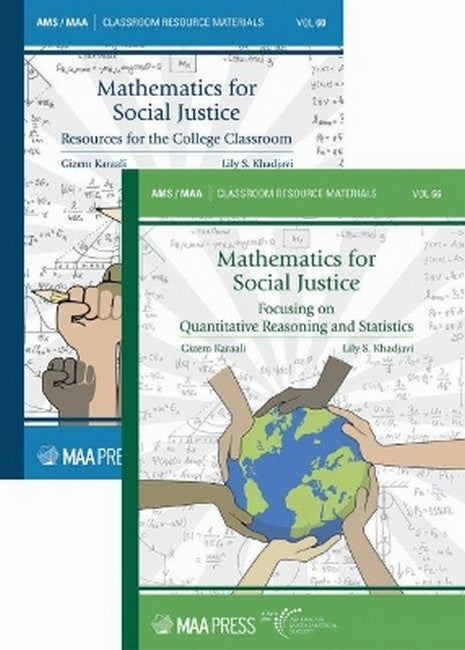Gizem Karaali, Pomona College, Claremont, CA. Lily Khadjavi, Loyola Marymount University, Los Angeles, CA.
Request Academic Copy
Please copy the ISBN for submitting review copy form
Description
Part : Getting started: G. Karaali and L. S. Khadjavi, An invitation to mathematics for social justice Essays: K. Hamman, Mathematics in service to democracy L. Marano, Preparing for student resistance: Rules of engagement for sensitive topics J. Hamilton and T. J. Pfaff, Social justice and sustainability: Two perspectives on the same system V. Piercey, Quantitative ethics D. Kung, Math for social justice: A last math class for responsible citizens Modules: D. Archey, Sea level change and function composition J. Beier, Exploring the problem of human trafficking G. Buhl and S. Q Kelly, Evaluating fairness in electoral districting S. Cohen and M. Pivarski, Modeling the 2010 Gulf of Mexico oil spill J. Cullinan and S. Hsiao, Voting with partially-ordered preferences J. Curran and A. Ross, Implementing Social Security: A historical role-playing game J. Glass and G. Karaali, Matching kids to schools: The school choice problem B. Gonzalez-Arevalo and W. Huang, Modeling the 2008 subprime mortgage crisis in the United States B. Gonzalez-Arevalo and W. Urbina-Romero, Using calculus to model income inequality K. Hamman, What does ""fair"" mean? A. Henderson and E. Kose, Social and environmental justice impacts of industrial agriculture R. Jaafar, Student loans: Fulfilling the American dream or surviving a financial nightmare? A. Vierling-Claassen, Modeling social change: The rise in acceptance of same-sex relationships J. Zobitz, T. Bibelnieks, and M. Lester, Sustainability analysis of a rural Nicaraguan coffee cooperative G. Karaali and L. S. Khadjavi, Postscript Part : G. Karaali and L. S. Khadjavi, Introduction J. Belock, Understanding over- and underrepresentation via conditional probability A. Brisbin, ""I need a job!"": Analyzing unemployment rates in college algebra and introductory statistics T. M. Brown, A three-part module on poverty F. Fisher and J. Warner, A gentrification module for quantitative reasoning M. M. Franco, Examining human rights issues through the lens of statistics T. Galanthay and T. J. Pfaff, Normal isn't ``normal'' when it comes to income T. Galanthay and T. J. Pfaff, Get the lead out: The connection between lead and crime D. Greenberg, D. Hughes Hallett, and L. S. Khadjavi, Policing and the issue of racial profiling A. J. Miller, Measures of income inequality K. Piatek-Jimenez, Super Size Me: Exploring the nutrition of fast food K. Piatek-Jimenez, Exploring the benefits of recycling V. Piercey, The new Jim Crow: A racial checkup for the United States K. Simic-Muller, Who makes the minimum wage? J. Suzuki, Mandatory drug tests for recipients of public assistance: Mathematical interpretations and implications J. Suzuki, The limits of partisan gerrymandering Z. Teymuroglu and J. C. Chambliss, Forecasting the past: Teaching regressions U. Williams, Partisan politics and central tendencies G. Karaali and L. S. Khadjavi, Mathematics for social justice: Closing thoughts and next steps
For mathematics faculty who are interested in incorporating questions regarding social justice into their classrooms, Mathematics for Social Justice offers a variety of resources that can kick start the process. This book is a collection of essays and modules that gives the reader a plethora of ideas for integrating questions of social justice into the mathematics classroom."" -Paula R. Stickles, Millikin University

